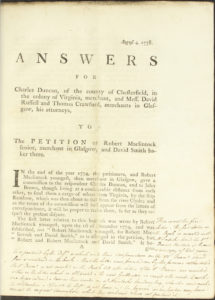Looking for Early America in the Scottish Court of Session Collection at the UVA Law Library
Written by Jim Ambuske, Ph.D. Col’16, Postdoctoral Fellow in Digital Humanities, Arthur J. Morris Law Library, School of Law, University of Virginia
If you’ve ever walked down the Royal Mile in Edinburgh, Scotland, then there’s a good chance that you missed it. No one would blame you. The gray stones of the city’s medieval heart, with its whisky shops, woolen wares, and imposing buildings draw your eye, while bagpipers serenade your soul. Yet, just down the road from the castle, a fortress built upon a volcanic remnant, you’ll find the Court of Session in Parliament Square nestled just behind St. Giles’ Cathedral.
Scotland’s Supreme Civil Court would be an unlikely stop on any tourist’s agenda. Most court visitors come as litigants in civil matters, although it is well worth your time. The Old Scottish Parliament met in the space just next to the court before voting itself out of existence in the 1707 Act of Union that joined England and Scotland to create Great Britain.
But you’ll soon be more familiar with the Court of Session thanks to an ongoing digitization project at the Arthur J. Morris Law Library at the University of Virginia School of Law. Thirty years ago, the Law Library’s Special Collections department acquired documents relating to approximately 2,500 cases heard before the court between 1757 and 1834. The papers fill 64 feet of shelf space in the vault, making it one of the Law Library’s largest archival collections. They join a Rare Book Room rich in Scottish legal texts from the same era.
Court of Session documents are unique for their period. While English and American courts conducted the majority of their business with handwritten documents, the Court of Session did its work in print. As a result, these documents are very readable. And while readers unfamiliar with Scots Law will encounter terms like “multiplepoinding” or “interlocutor” in the text, the value of this material rests in the stories they contain about the lives of people both ordinary and powerful.
Despite its seat in Edinburgh, the legal disputes that came before the Court often included people living in Great Britain, Europe, Africa, North America, and India. The petitions, briefs, submitted evidence, and appendixes within this collection follow people circulating in these spaces as they protected their physical and intellectual property, conducted business, engaged in marriage or divorce, and established personal and economic connections that spanned vast distances.
Charles Duncan is but one example. The Scottish-born merchant settled in Chesterfield County, Virginia sometime in the late 1750s or early 1760s, probably as an employee of a Glasgow-based merchant house. In 1774, Duncan became embroiled in a lawsuit over a shipment of wheat. A lower Glaswegian court heard the case first before it made its way to the Court of Session, where Duncan’s Scottish attorneys represented his interests.
Duncan’s involvement in this case and the details about him in the documents lead to evidence in other archives that help us reconstruct his life. We know that Duncan traded primarily in tobacco and that he owned a farm called Roslin near Petersburg, VA. He died in 1808 while visiting England with his daughter, Charlotte Smith Gamble, leaving behind property valued at least £4,000, including at least seventeen slaves, among them Shaltee and her daughter, Jean. We know the names of Duncan’s enslaved people in part by pulling threads present in these Scottish court documents.
A Law Library Special Collections research team is digitizing the Library’s Court of Session collection and building a digital archive to make them freely available to the public. Historians, lawyers, librarians, and students are working together to identify people, places, and organizations within the material, coding them in a custom-built database, and running the digital images through Optical Character Recognition (OCR) software to make downloadable PDF copies of the documents fully text searchable.
These Court of Session papers can help us unlock hidden histories of our shared past. They offer new insight into how people lived in the eighteenth and early nineteenth centuries, and help us recover lost voices such as Shaltee’s and Jean’s in the archival record. Look for an initial run of the papers online soon.
For more information about this Law Library initiative, including how you can support it, please contact Jim Ambuske at Ambuske@law.virginia.edu.
- Life at the Top: Climate Change in Utqiaġvik, Alaska
- The Only Thing We Have to Fear is Fear Itself
- Stay on Track: Turning Resolutions into Results
- UVA Club of Tidewater: Hoos at Harbor Park
- UVA Club of Atlanta: Cavs Care - Volunteer Income Tax Assistance Events
- UVA Club of Charlottesville: Hoos Reading Hoos Book Club

